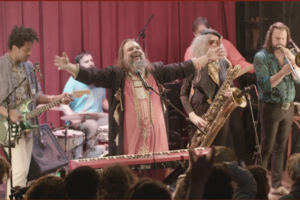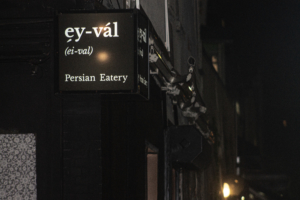Cover or tribute bands occasionally get a bad rap as unoriginal or are relegated to die-hard fans hoping to see a replica of their favorite act. Walrus, which is a Beatles jam band, is a little different.
Drawing on influences from the long tradition of jam bands, from the Grateful Dead to Phish, Walrus members Chris Mackin (guitar/vocals), Bradley Michalakis (bass/vocals), Satoko Mori (keyboard/vocals), Josh Santiago (guitar/vocals) and Dan Shein (drums) push the envelope of what fans have come to expect from the Fab Four’s vast catalog, with fresh arrangements and a knack for improvisation.
All have been musicians their whole lives, but Walrus’ deepest roots as a group are in Merrick, Long Island, where Mackin, Michalakis and Shein grew up. After meeting Santiago in college, the four became involved in each others’ music and theater projects — careers they all continue to pursue today. Michalakis and Mackin both work in theater production, Shein in the movie industry and Santiago teaches theater. Mori, who joined the group through their theater company’s pit band in 2017, is also a performing pianist and teacher.
Walrus’ music isn’t yet widely available on streaming services, but you can check out their rendition of the classic Beatles’ tune “Happiness Is A Warm Gun” on YouTube. They’re also trying to raise money through Patreon to cut a record.
The local band is also going to be playing their latest rendition of the Beatles’ Abbey Road at Brooklyn Bowl on Saturday, August 6. Tickets and more information can be found here.
I caught up with the band before a rehearsal at their usual Bushwick studio location to chat about how the band came together, performing in post-lockdown New York and the opportunity to play a venue they’ve frequented for years. The interview has been edited and condensed.
Bushwick Daily: So were you all Beatles fans first, or did you know each other already and then settle on the Beatles’ catalog for this project?
Chris Mackin: Brad, Dan and I grew up together in Merrick, Long Island. So we’ve known each other since high school. Josh and I met in college, and then Dan came to the same college and we all met Satoko maybe seven years ago now, maybe six?
Satoko Mori: 2017! Five years ago!
Mackin: I remember it was for a show — we used to be a theater company before…
Bradley Michalakis: A clown troupe!
Shein: Ironically, back in college, we actually played a couple of Beatles songs.
Mackin: No! Just one song repeated! It was “You Won’t See Me.” Why that one, I have no idea — we never play it now!
Michalakis: We played it too much back in the day and we just never really created a fun arrangement.
Shein: We won’t just do a Beatles song the way they did — we have to have our own way of doing it.
BD: What does that process of interpreting the songs for yourselves look like?
Mackin: We’ve played music forever, you know, and Dan and I have played together since high school. And then during college, Brad and I had a company that would do Shakespeare during the summer. And so we actually found it very natural to go from Shakespeare to the Beatles. They’re, you know, old British people who created great stuff!
Shein: Famously writing during the same period.
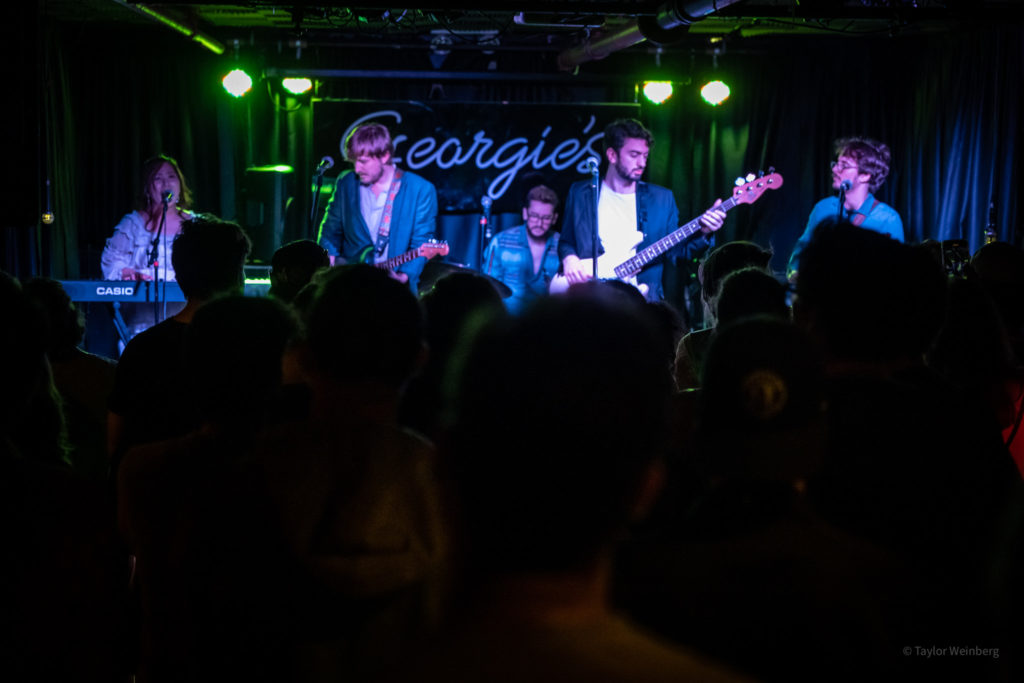
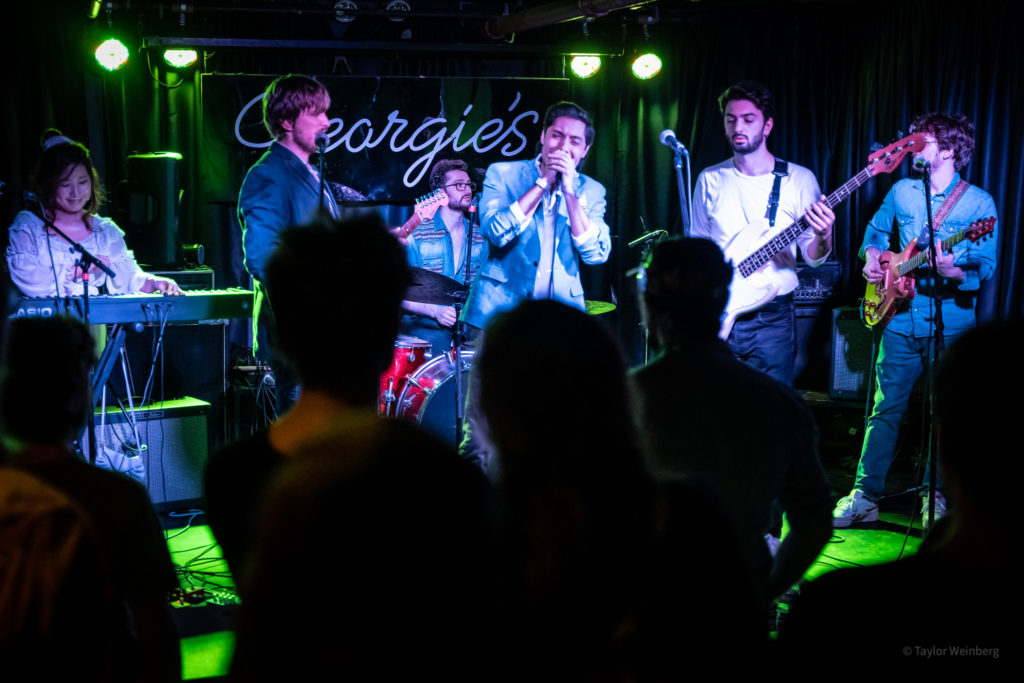
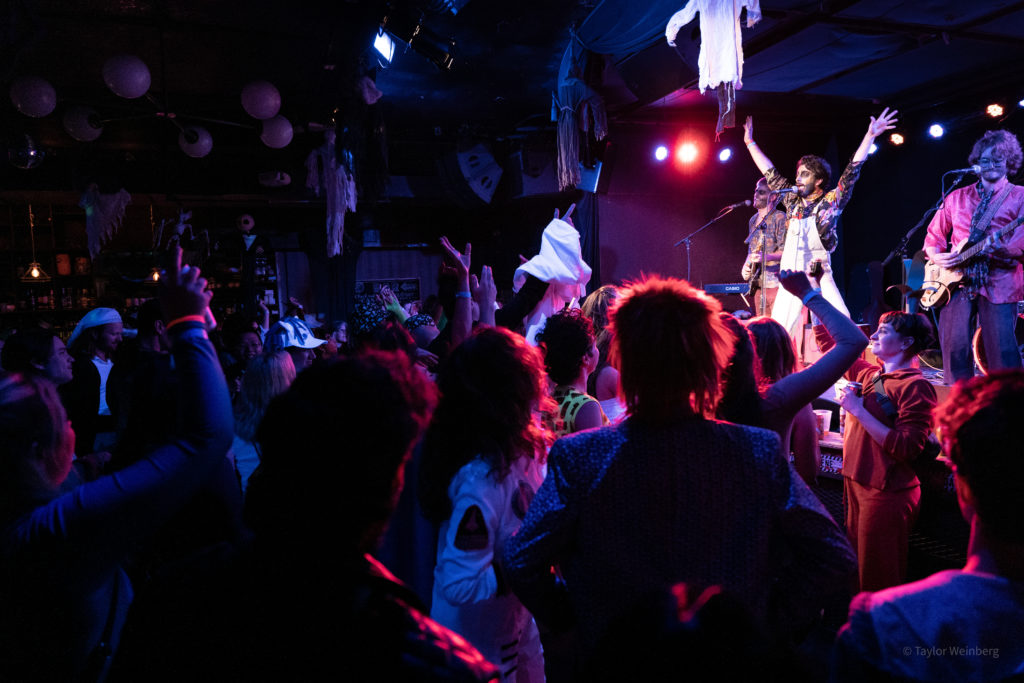
Mackin: Of course! And so after the summer Shakespeare we started a theater company when we moved to the city called Loop Troupe, which is still the production company we run everything through, and Loop Troupe started by doing plays. Then we started doing more musicals and developed this show called “Taking It Too Far,” which was kind of a sketch show with clownery and mimes and music, and developed a band to go along with the show. The pit band for Taking It Too Far pretty much became Walrus.
Michalakis: After the pandemic, it was hard to go back into doing originals just because the audience wasn’t there as much. We were looking for a semi-regular place to do shows and I met someone from The Delancey and pitched him a few ideas — the Beatles one was the idea he latched onto. So we got to do a residency at The Delancey, with a few breaks, from November of last year through this May.
BD: So when I hear “jam band,” I immediately think of the Grateful Dead and a 20-minute rendition of whatever song they’re playing.
Mackin: We are huge Deadheads and we also love Phish, so we have played some of the Dead’s music and are drawn to that kind of improvisation and long arrangement. After we played the Beatles Valentine’s show, we just started playing more Beatles songs together. It occurred to us that these songs aren’t being played live in a fun and interesting way.
Michalakis: We come at it in a very academic way and have sort of developed our own lexicon for communicating while we arrange. For example, yesterday we were working on a song and decided we wanted to do it like a disco song. So, we did this classic disco beginning we already know, learned the Earth, Wind and Fire version of “Got To Get You Into My Life” and said “okay, let’s try to make our sound more like that.”
We’ve developed a lot of shared reference points over the years and can start with an idea like “What if Vampire Weekend did ’Polythene Pam’?” or “What if Pink Floyd did ’Happiness Is A Warm Gun’?” and go from there.
Mackin: I think if the Beatles were writing music now…
Michalakis: They’d love us!
Mackin: They wouldn’t like us! They’d hate us!
BD: I feel like it might vary from Beatle to Beatle.
Mackin: What I’m trying to get at is, at the time in which they did write, the Beatles were playing upon every style of music that existed up until then. So disco hadn’t been invented yet when the Beatles were releasing new music, but we kind of imagine when we’re approaching a song that they might’ve written songs with disco or funk beats, or they probably would’ve used more hip hop and rap if they had come later. That being said, nothing would have come later without the Beatles being there, which kind of gives us a paradox.
Josh Santiago: I don’t want to say we’re bigger than John Lennon, but I’m just tossing around an idea.
Michalakis: Also a big reason for choosing the Beatles’ catalog is that, because most of us have a theatrical background, we’ve always been very focused on the audience experience and what people respond to. So many people have a preexisting connection to the Beatles and respond to their music and have all these preconceived ideas about it.
Mackin: If we do these radical interpretations of the songs, of course somebody is going to say “I wanted to hear the original.” But some of that stuff, especially from the later portion of their catalog after they stopped, we couldn’t play even if we wanted to!
BD: Do you all see the Beatles as a sort of connecting point for a lot of pop music today?
Josh: Yeah, you could say so. I think there are things that are radically different about pop music today, but there has also been a resurgence of things like complex harmony — Silk Sound and Harry Styles are really good examples of this — that are similar to those complicated harmonies that the Beatles did very well.
Mackin: The Beatles are hard to play. Even when it sounds like such a simple song, they can get really complicated.
Shein: I still can’t count us into “Drive My Car.”
Michalakis: The beginning of “Drive My Car” is insanely hard, you know…
[The group begins vocalizing the opening riff to “Drive My Car.”]
Shein: There’re a lot of different theories about how it works, but it’s just not as simple as it sounds.
For more news, sign up for Bushwick Daily’s newsletter.
Join the fight to save local journalism by becoming a paid subscriber.

